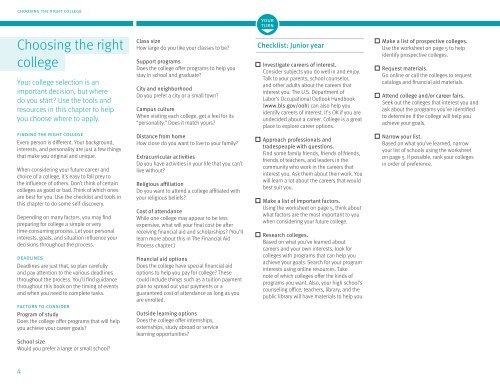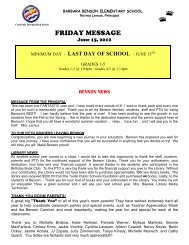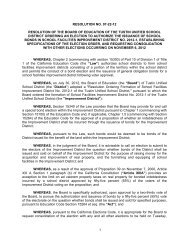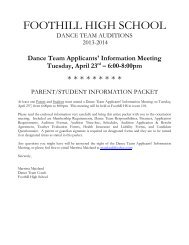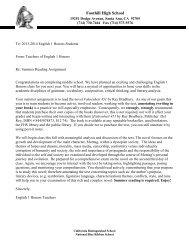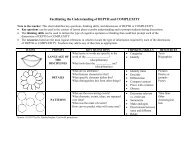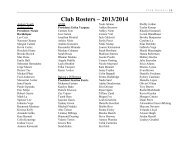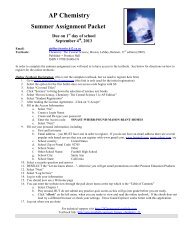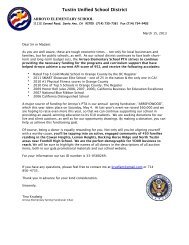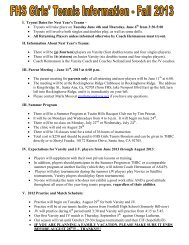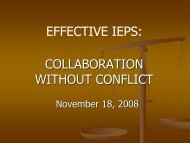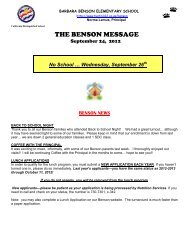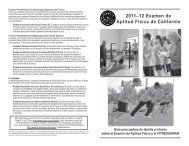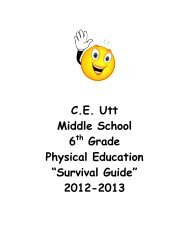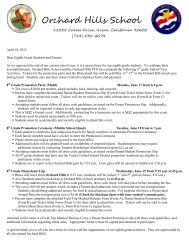College Planning - Tustin Unified School District
College Planning - Tustin Unified School District
College Planning - Tustin Unified School District
Create successful ePaper yourself
Turn your PDF publications into a flip-book with our unique Google optimized e-Paper software.
choosing the right college<br />
your<br />
turn<br />
Choosing the right<br />
college<br />
Your college selection is an<br />
important decision, but where<br />
do you start? Use the tools and<br />
resources in this chapter to help<br />
you choose where to apply.<br />
finding the right college<br />
Every person is different. Your background,<br />
interests, and personality are just a few things<br />
that make you original and unique.<br />
When considering your future career and<br />
choice of a college, it’s easy to fall prey to<br />
the influence of others. Don’t think of certain<br />
colleges as good or bad. Think of which ones<br />
are best for you. Use the checklist and tools in<br />
this chapter to do some self-discovery.<br />
Depending on many factors, you may find<br />
preparing for college a simple or very<br />
time-consuming process. Let your personal<br />
interests, goals, and situation influence your<br />
decisions throughout the process.<br />
deadlines<br />
Deadlines are just that, so plan carefully<br />
and pay attention to the various deadlines<br />
throughout the process. You’ll find guidance<br />
throughout this book on the timing of events<br />
and when you need to complete tasks.<br />
factors to consider<br />
Program of study<br />
Does the college offer programs that will help<br />
you achieve your career goals?<br />
<strong>School</strong> size<br />
Would you prefer a large or small school?<br />
Class size<br />
How large do you like your classes to be?<br />
Support programs<br />
Does the college offer programs to help you<br />
stay in school and graduate?<br />
City and neighborhood<br />
Do you prefer a city or a small town?<br />
Campus culture<br />
When visiting each college, get a feel for its<br />
“personality.” Does it match yours?<br />
Distance from home<br />
How close do you want to live to your family?<br />
Extracurricular activities<br />
Do you have activities in your life that you can’t<br />
live without?<br />
Religious affiliation<br />
Do you want to attend a college affiliated with<br />
your religious beliefs?<br />
Cost of attendance<br />
While one college may appear to be less<br />
expensive, what will your final cost be after<br />
receiving financial aid and scholarships? (You’ll<br />
learn more about this in The Financial Aid<br />
Process chapter.)<br />
Financial aid options<br />
Does the college have special financial aid<br />
options to help you pay for college? These<br />
could include things such as a tuition payment<br />
plan to spread out your payments or a<br />
guaranteed cost of attendance as long as you<br />
are enrolled.<br />
Outside learning options<br />
Does the college offer internships,<br />
externships, study abroad or service<br />
learning opportunities?<br />
Checklist: Junior year<br />
Investigate careers of interest.<br />
Consider subjects you do well in and enjoy.<br />
Talk to your parents, school counselor,<br />
and other adults about the careers that<br />
interest you. The U.S. Department of<br />
Labor’s Occupational Outlook Handbook<br />
(www.bls.gov/ooh) can also help you<br />
identify careers of interest. It’s OK if you are<br />
undecided about a career. <strong>College</strong> is a great<br />
place to explore career options.<br />
Approach professionals and<br />
tradespeople with questions.<br />
Find some family friends, friends of friends,<br />
friends of teachers, and leaders in the<br />
community who work in the careers that<br />
interest you. Ask them about their work. You<br />
will learn a lot about the careers that would<br />
best suit you.<br />
Make a list of important factors.<br />
Using the worksheet on page 5, think about<br />
what factors are the most important to you<br />
when considering your future college.<br />
Research colleges.<br />
Based on what you’ve learned about<br />
careers and your own interests, look for<br />
colleges with programs that can help you<br />
achieve your goals. Search for your program<br />
interests using online resources. Take<br />
note of which colleges offer the kinds of<br />
programs you want. Also, your high school’s<br />
counseling office, teachers, library, and the<br />
public library will have materials to help you.<br />
Make a list of prospective colleges.<br />
Use the worksheet on page 5 to help<br />
identify prospective colleges.<br />
Request materials.<br />
Go online or call the colleges to request<br />
catalogs and financial aid materials.<br />
Attend college and/or career fairs.<br />
Seek out the colleges that interest you and<br />
ask about the programs you’ve identified<br />
to determine if the college will help you<br />
achieve your goals.<br />
Narrow your list.<br />
Based on what you’ve learned, narrow<br />
your list of schools using the worksheet<br />
on page 5. If possible, rank your colleges<br />
in order of preference.<br />
4


